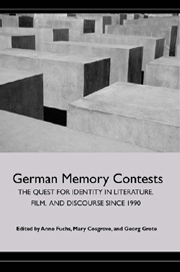Book contents
- Frontmatter
- Contents
- Acknowledgments
- Introduction: Germany's Memory Contests and the Management of the Past
- Positions
- 1 What Exactly Is Vergangenheitsbewältigung? Narrative and Its Insufficiency in Postwar Germany
- 2 The Tinderbox of Memory: Generation and Masculinity in Väterliteratur by Christoph Meckel, Uwe Timm, Ulla Hahn, and Dagmar Leupold
- 3 Telling It How It Wasn't: Familial Allegories of Wish-Fulfillment in Postunification Germany
- Mediations
- Ethnicity/Hybridity
- Memory Politics
- Works Cited
- Notes on the Editors and Contributors
- Index
3 - Telling It How It Wasn't: Familial Allegories of Wish-Fulfillment in Postunification Germany
from Positions
Published online by Cambridge University Press: 05 February 2013
- Frontmatter
- Contents
- Acknowledgments
- Introduction: Germany's Memory Contests and the Management of the Past
- Positions
- 1 What Exactly Is Vergangenheitsbewältigung? Narrative and Its Insufficiency in Postwar Germany
- 2 The Tinderbox of Memory: Generation and Masculinity in Väterliteratur by Christoph Meckel, Uwe Timm, Ulla Hahn, and Dagmar Leupold
- 3 Telling It How It Wasn't: Familial Allegories of Wish-Fulfillment in Postunification Germany
- Mediations
- Ethnicity/Hybridity
- Memory Politics
- Works Cited
- Notes on the Editors and Contributors
- Index
Summary
GDR literature was highly dialogic. Given the level of state control over journalism and film, the literary field offered an arena of coded debate for the discerning reader to decipher. Literature mattered; it was politically significant. In postunification times state intervention has receded, but leitmotivic echoes and aesthetic stratagems still wander from text to text as vehicles of political and moral argument feeding on and into the often bitter polemics in the journalistic media. The polemics frequently turn on competing historical paradigms, taking the form of memory contests. As Mary Fulbrook notes, a sense of acceptable national identity is often constructed by singing tales of heroes and martyrs. GDR orthodoxy celebrated the heroes and martyrs of the communist resistance and the survivors who, together with workers by hand and brain, built up the new socialist state: “Auferstanden aus Ruinen” (Arisen from Ruins), as the national anthem put it. But now that the orthodox song sheet has been torn up, how is a sense of national identity to be constructed in the Berlin Republic that will be acceptable to citizens of the former GDR and help to close the mental gap between east and west Germans?
Obvious heroes in popular accounts of unification are the people who poured through the Wall on 9 November 1989. The protesters in Leipzig or Berlin and the intellectuals who spoke to the masses in Alexanderplatz also figure, if more ambiguously, as critics of the GDR state but not necessarily heroes of unification, since many of them looked to a Third Way.
- Type
- Chapter
- Information
- German Memory ContestsThe Quest for Identity in Literature, Film, and Discourse since 1990, pp. 67 - 84Publisher: Boydell & BrewerPrint publication year: 2006

